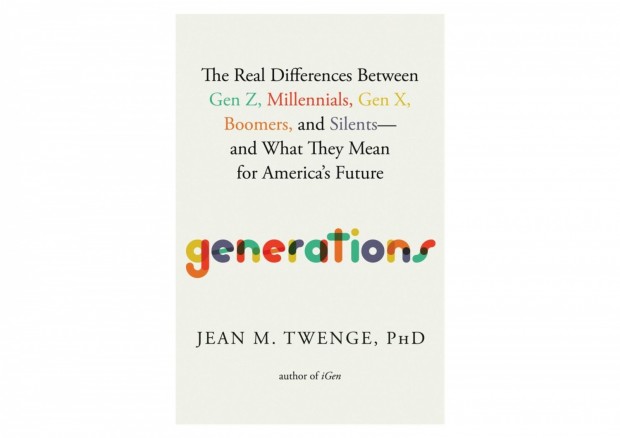Jean Twenge’s New Book Dives Into the Differences Between Generations

Explore generational similarities and differences between Silents, Baby Boomers, Generation X, Millennials, Generation Z, and Generation Alpha with Jean M. Twenge's new book, 'Generations.' (Photo : Simon & Schuster)
In her new book, 'Generations,' Professor Jean M. Twenge dives deep into the differences between various generations in America. Known for her previous works like 'Generation Me' and 'iGen,' Twenge uses data to explore the beliefs, behavior, and values of six generations shaping American culture.
Twenge relies on extensive research, using government-funded surveys and databases, to analyze the impact of historical events, technological advancements, and cultural shifts on each generation. She covers the Silents, Baby Boomers, Generation X, Millennials, Generation Z, and Generation Alpha. Twenge playfully refers to Generation Alpha as polars because their future name remains uncertain, like melting polar ice caps and political polarization.
As an expert on generational change, Twenge delves into the aspirations of the Silents and Boomers for their future, examines how Gen X-ers navigate middle age, explores the parenting and workplace ideals of Millennials, and discusses how Gen Z has been impacted by COVID, among other intriguing subjects.
Twenge emphasizes the importance of understanding each other's perspectives across different generations. She dismisses the need for guesswork, thanks to the abundance of Big Data available today.
The heart of Twenge's analysis lies in the influence of technology and the slow life strategy on generational dynamics. She expands beyond smartphones and the internet, examining how technology, including early household appliances and medical advancements, has shaped the pace of life and influenced the shift from collectivism to individualism.
READ ALSO: Harry Potter' Book Covers Evolved Through the Years, Which is Your Favorite [LOOK]
Twenge explores each generation's unique experiences, from the activism of the Silents to the political evolution of Baby Boomers and the resilience of Generation X. She dedicates attention to Millennials and delves into the impact of technology on Generation Z, highlighting the mental health crisis among this generation.
According to demographer Joshua Kim, 'Generations' highlights the diversity of the upcoming postsecondary workforce, with nearly half of Gen Z being nonwhite. The book also emphasizes the importance of accommodating Gen Z's unique needs to attract and retain millennial and Gen Z faculty. It addresses the mental health challenges of Gen Z, attributing them to social media and smartphones. The book suggests that higher education leaders need to consider creating workplaces that appeal to Gen Z for the future of academia.
Twenge and Moore also talk about disparities and similarities among generations. They explore the reasons behind the notable age gap between government leaders and the majority of the population, the significance of generational changes reflected in child-naming practices, and the impact of technology on the rise of individualism. The discussion touches upon the varying importance placed on self-esteem across different age groups, the effects of smartphones on mental health, and the consequences of society's evolving perception of marriage.
The book challenges skepticism about generalizing entire groups based on birth years, acknowledging the artificial nature of such classifications but defending them as common human practices.
'Generations' is a meticulously researched resource that does not need to be read linearly. Twenge encourages readers to explore chapters based on individual interests and curiosities, offering famous people from each generation to spark nostalgia.
In conclusion, Twenge's 'Generations' promises to reshape readers' views of their parents, peers, coworkers, and children. By weaving together history, technology, and cultural evolution, Twenge provides a compelling narrative that defines each generation and reveals the intricate connections binding them across time.
RELATED ARTICLE: 5 Insightful Books Showing Us Why Our Lives Are The Way They Are
© 2023 Books & Review All rights reserved.
Popular Now
1
Books to Read After 'Fourth Wing': Top Picks for Fantasy and Romantasy Fans

2
‘The Secret Public’ by Jon Savage Book Review: An Insightful Look Into the LGBTQ Influence

3
Stephanie Regalado's 'If They Only Knew' Column Is Now A Book, Unleashing 60 Anonymous True Stories to Empower Women

4
'No Wire Hangers' Scene That Almost Did Not Happen: New Book Reveals Faye Dunaway's Struggles

5
Rare First Edition of Aphra Behn's Novel 'Oroonoko' Discovered in Kent: A Historic Literary Find

Latest Stories
Book Reviews
‘The Secret Public’ by Jon Savage Book Review: An Insightful Look Into the LGBTQ Influence

Book News
Stephanie Regalado's 'If They Only Knew' Column Is Now A Book, Unleashing 60 Anonymous True Stories to Empower Women

Book News
'No Wire Hangers' Scene That Almost Did Not Happen: New Book Reveals Faye Dunaway's Struggles

Book Reviews
‘The Perfect Couple’ by Elin Hilderbrand Book Review: A Captivating Summer Mystery

Book News
New Book ‘The Franchise’ Reveals Penguins President Kyle Dubas’ ‘Biggest Mistake’ as Maple Leafs GM











